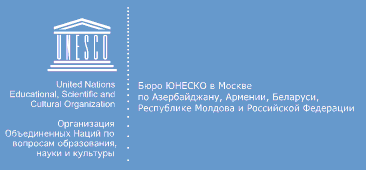United Nations Educational, Scientific and Cultural Organization (UNESCO)

UNESCO - the United Nations Educational, Scientific and Cultural Organization (UNESCO) was founded on 16 November 1945. UNESCO Headquarters is established in Paris.
UNESCO Moscow Office for Azerbaijan, Armenia, Belarus, the Republic of Moldova and the Russian Federation
Representation of the United Nations Educational, Scientific and Cultura Organization in Moscow, the UNESCO Moscow Office, was opened in 1994 and it started its full operation since 1996. Before 2002 the Office operated as the representation of UNESCO in the Russian Federation. In 2002, within the framework of implementation of decentralization policy, the UNESCO Moscow Office becomes a cluster Office and now it works for Azerbaijan, Armenia, Belarus, the Republic of Moldova and the Russian Federation.
Director: Mr. Dendev Badarch
The purpose of the Organization was defined as: "to contribute to peace and security by promoting collaboration among nations through education, science and culture in order to further universal respect for justice, for the rule of law and for the human rights and fundamental freedoms which are affirmed for the peoples of the world, without distinction of race, sex, language or religion, by the Charter of the United Nations’. More…
The introduction of the Constitution of UNESCO – called the Preamble – declares that ‘since wars begin in the minds of men, it is the minds of men that the defences of peace must be constructed’.
So that a unanimous, lasting and genuine peace may be secured, the Preamble declares that the States Signatory to the Constitution believed ‘in full and equal opportunities for education for all, in the unrestricted pursuit of objective truth and in the free exchange of ideas and knowledge’.
The office plays an active role in realization of the follow projects:
- supporting the reform and development of the education systems in the cluster countries with special attention to the development of Education for all National Action Plans and to HIV/AIDS Preventive Education and with particular support to the Russian Federation in the restoration and modernisation of the education system in the Chechen Republic.
- discussing science policy and the concept of a culture of innovation, strengthening Biosphere Reserves;
- promoting human rights and democratic principles with young people set as a target group;
- promoting cultural diversity, with special emphasis on tangible and intangible cultural heritage;
- promoting universal access to knowledge, the strengthening of democratic norms in information and communication.
Current Activities:
EDUCATION
- Restoration of the education system in the Chechen Republic
- UNESCO Moscow Office implements activities aimed to support upgrading of the educational staff of the Chechen Republic.
- HIV/AIDS preventive education
- UNESCO supports the Ministry in the implementation of the HIV/AIDS prevention education program for pedagogic universities as well as in developing a national inventory and database of education programs on HIV/AIDS in the Russian Federation.
NATURAL SCIENCES
- Water, Society & Ecology
- An enhanced people-oriented interdisciplinary approach to the sustainable use and management of water and fresh water resources and associated ecosystems, as well as of biodiversity resources, was recommended by the World Summit on Sustainable Development (Johannesburg, 2002).
- Ecological and earth sciences for sustainable development
- UNESCO’s Ecology related programmes notably focus on an interdisciplinary research agenda spanning the ecological, social and economic dimensions of biodiversity loss and its reduction.
SOCIAL AND HUMAN SCIENCES
- Bioethics
- Since the 1970s, UNESCO's involvement in the field of bioethics has reflected the international dimensions of this debate. Founded on the belief that there can be no peace without the intellectual and moral solidarity of humankind, UNESCO tries to involve all countries in this international and transcultural discussion
- Human Rights
-
UNESCO Programme in Human Rights has three major aims:
- strengthen awareness;
- act as a catalyst for regional, national and international action in human rights;
- foster cooperation with all actors and networks.
CULTURE
- Cultural Diversity for Dialogue and Development
- The UNESCO Universal Declaration on Cultural Diversity for Dialogue and Development unanimously adopted by the 185 member states in November 2001 at the UNESCO General Conference, is the founding act of a new ethic in cultural co-operation.
- Intangible Heritage
- Cultural heritage, which is characterized by a multitude of sources and which is considered a repository of human memory, embodies the symbolic meaning of cultural uniqueness that is the foundation of our communities. Convention for the Safeguarding of the Intangible Cultural Heritage (2003) includes oral traditions and expressions, including language as a vehicle of the intangible cultural heritage, performing arts, social practices, rituals and festive events, knowledge and practices concerning nature and the universe and traditional craftsmanship.
COMMUNICATION AND INFORMATION
- Access to information and knowledge for development and social inclusion
- The UNESCO Moscow Office's efforts to promote free and universal access to information and knowledge, and thus, to enhance social inclusion in the cluster countries were aimed at empowering various groups of population, particularly inhabitants of small and remote areas, especially young people, in order to improve participation in the development process and contribute to empowerment and poverty reduction.
- Press freedom and freedom of expression
- UNESCO promotes freedom of expression and freedom of the press and fosters media independence and pluralism as a basic human right.
Partners
- Official web-site of the National Commission of the Azerbaijan for UNESCO
- Official web-site of the National Commission of the Armenia for UNESCO
- Official web-site of the National Commission of the Republic of Belarusfor UNESCO
- Official web-site of the National Commission of the Republic of Moldova for UNESCO
- Official web-site of the Commission of the Russian Federation for UNESCO
Contact Us
-
Address — 15, bld. 2, Bolshoi Levshinsky per., 119034 Moscow, Russia
Phones:
495 / 637-28-75
495 / 637-29-53
495 / 637-29-62 Fax:
495 / 637-39-60 E-mail: moscow@unesco.org

